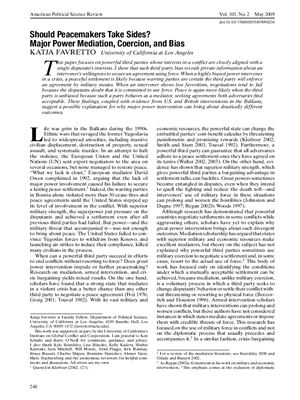This paper focuses on powerful third parties whose interests in a
conflict are closely aligned with a
single disputant’s interests. I show that such third-party bias reveals private information about an
intervener’s willingness to secure an agreement using force.When a highly biased power intervenes
in a crisis, a peaceful settlement is likely because warring parties are certain the third party will enforce an agreement by military means. When an intervener shows less favoritism, negotiations tend to fail because the disputants doubt that it is committed to use force. Peace is again more likely when the third party is unbiased because such a party behaves as a mediator, seeking agreements both adversaries find acceptable. These findings, coupled with evidence from U.S. and British interventions in the Balkans, suggest a possible explanation for why major power intervention can bring about drastically different outcomes.
single disputant’s interests. I show that such third-party bias reveals private information about an
intervener’s willingness to secure an agreement using force.When a highly biased power intervenes
in a crisis, a peaceful settlement is likely because warring parties are certain the third party will enforce an agreement by military means. When an intervener shows less favoritism, negotiations tend to fail because the disputants doubt that it is committed to use force. Peace is again more likely when the third party is unbiased because such a party behaves as a mediator, seeking agreements both adversaries find acceptable. These findings, coupled with evidence from U.S. and British interventions in the Balkans, suggest a possible explanation for why major power intervention can bring about drastically different outcomes.

